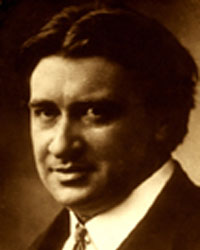Born in Venice to a German father and an Italian mother, this duality had a strong influence on Wolf-Ferrari’s life. He showed great talent from an early age and his father, a painter, trained him in the arts of painting and drawing. He began piano lessons at the age of six, but after four years outgrew his teacher. His father took him to Munich in 1892 to attend the Holosy School of Painting, but soon realised that his son’s true vocation was music. In the autumn of the same year, he passed the entrance examination for Josef Rheinberger’s counterpoint class and had his first composition, a Serenade for string orchestra, performed at the Odeon in Munich. From 1982 to 1895, he studied at the Academy of Music and after graduating returned to Venice, where he composed his first opera, Irene, which remains incomplete and unperformed to this day. At 21, he found a position as a chorus director in Milan and started work on La Cenerentola (Cinderella), which took him three years to complete. It was first performed in Venice in 1900, but was received unfavourably. He returned to Munich to compose and the German première of Cenerentola in Bremen in 1902 was, however, a great success. This contrast between the reception his works received in Germany and Italy was a source of considerable agitation to him and led him to spend most of the rest of his life in Germany, although homesickness brought him home toVenice from time to time. He became the director of the Conservatorium in Venice in 1902, a post he held until 1909, but left for Munich in that year and settled there. He achieved his greatest successes with sparkling stage comedies like The Inquisitive Women, The School for Fathers and the one-act Susanna’s Secret, the latter of which is still staged regularly today. Wolf-Ferrari’s own personal favourite among his operas, Das Himmelskleid (The Garment of the Sky) has recently been recorded for the first time at the Theater Hagen’s excellent revival by Marco Polo. In 1947, back in Venice, he began to write his last symphonic work, The Churches of Venice, but he died before completing it, shortly after his 72nd birthday. _________________________________________________ The works published by the Casa Musicale Sonzogno belong to Wolf-Ferrari’s years of maturity: they consist of the operas Sly (1927) and La vedova scaltra (1931), and the orchestral works Violin Concerto in D and Symphonia Brevis. After its promising debut at La Scala with Aureliano Pertile, Sly was subsequently limited to the repertoire of German theatres, but it has recently been brought to international notice by José Carreras (Washington, Barcelona, Zurich, Turin, Tokyo) and Placido Domingo (Metropolitan Opera House, New York, and Teatro dell'Opera, Rome). With regard to La vedova scaltra, among the most significant interpreters of the role of Rosaura should be remembered Florica Cristoforeanu and Magda Olivero. |
|
|
|
|
Ermanno Wolf Ferrari - Composer Information
Search our Library
Featured Composers
Counterpoint Music Library Services
Copyright © 2012 All Rights Reserved
Copyright © 2012 All Rights Reserved
Created by Wavelength Media

